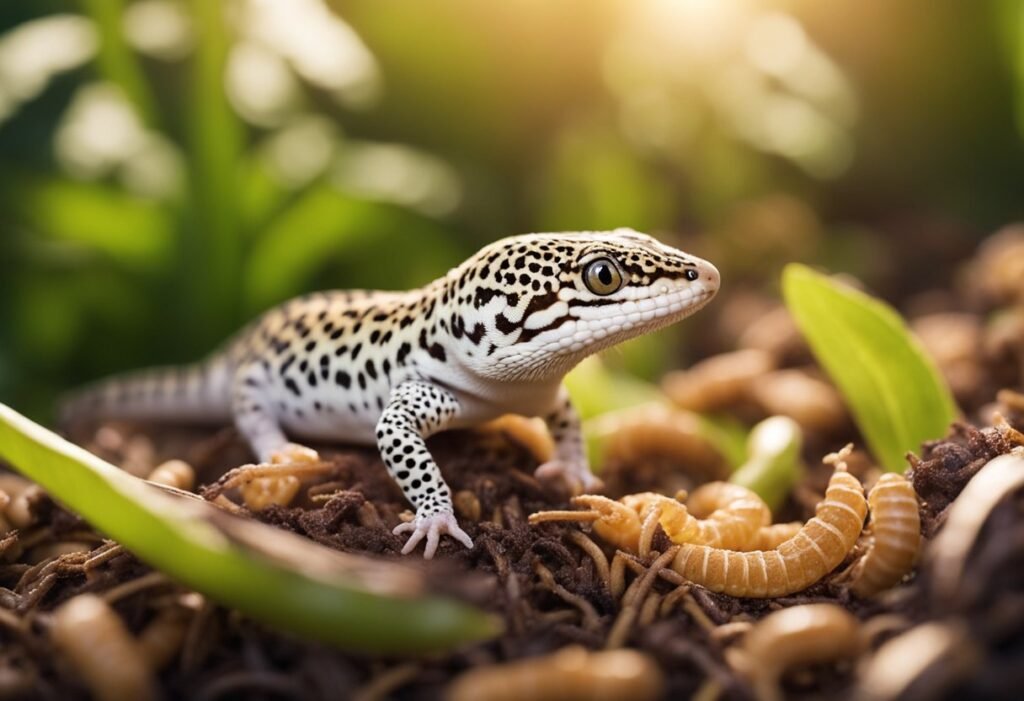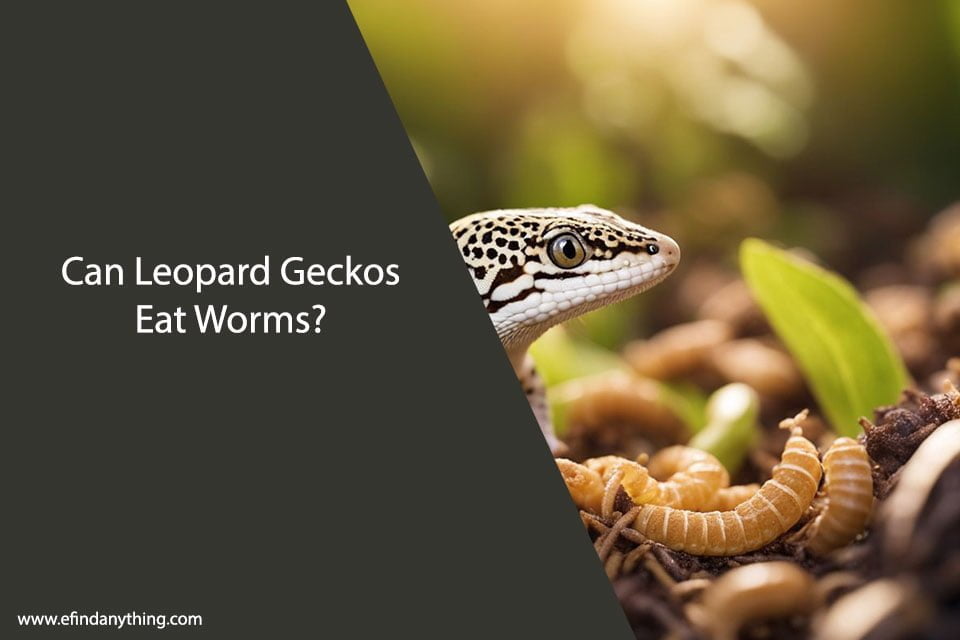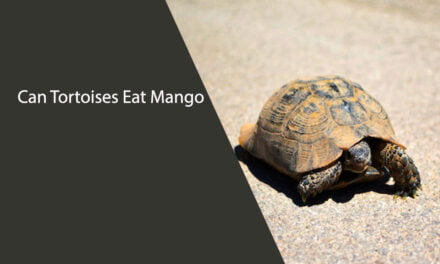Leopard geckos are a popular choice for reptile enthusiasts due to their unique appearance and docile nature. As with any pet, it is important to understand their dietary needs to ensure they remain healthy and happy. One common question that arises is whether leopard geckos can eat worms.
The short answer is yes, leopard geckos can eat worms. In fact, worms are a nutritious and readily available food source for these reptiles. However, it is important to note that not all worms are created equal and some may not be suitable for leopard geckos to consume. It is important to do your research and choose the right type of worm to feed your pet.
Table of Contents
Dietary Needs of Leopard Geckos

As responsible pet owners, we must ensure that our leopard geckos receive a well-balanced diet to maintain their overall health and longevity. In the wild, leopard geckos are opportunistic feeders, consuming a variety of insects and occasionally small vertebrates. In captivity, we must replicate this diet to ensure that our leopard geckos receive all the necessary nutrients.
The primary component of a leopard gecko’s diet should be insects. Crickets, mealworms, super worms, and dubia roaches are all excellent options. We recommend feeding appropriately sized prey items, as leopard geckos have small mouths and can choke on larger insects. Additionally, it’s essential to gut-load insects before feeding them to your leopard gecko. Gut-loading involves feeding the insects a nutritious diet before feeding them to your pet, ensuring that they are receiving the necessary vitamins and minerals.
Leopard geckos also require calcium and vitamin D3 to maintain healthy bones and prevent metabolic bone disease. Dusting insects with a calcium and vitamin D3 supplement before feeding them to your leopard gecko is an excellent way to ensure that they receive these essential nutrients. However, it’s crucial not to overdo it, as excessive calcium can also be harmful.
In conclusion, a well-balanced diet is essential for the health and longevity of leopard geckos. Feeding a variety of appropriately sized insects and gut-loading them before feeding them to your pet, along with dusting them with a calcium and vitamin D3 supplement, will help ensure that your leopard gecko receives all the necessary nutrients.
Benefits of Worms in a Leopard Gecko’s Diet

When it comes to feeding leopard geckos, worms are a popular and nutritious option. Here are some of the benefits of incorporating worms into your leopard gecko’s diet.
Nutritional Value
Worms are a good source of protein, which is essential for leopard geckos to maintain their health and energy levels. They also contain essential amino acids, vitamins, and minerals that are important for a balanced diet. For example, mealworms are high in calcium, which is crucial for leopard geckos to maintain healthy bones and prevent metabolic bone disease.
Digestibility
Worms are easy for leopard geckos to digest, which is important for their overall health. Unlike some other prey items, such as crickets, worms have a soft exoskeleton that can be easily broken down by the gecko’s digestive system. This means that leopard geckos are less likely to experience digestive issues or impaction when eating worms.
Variety and Enrichment
Offering a variety of prey items, including worms, can help keep your leopard gecko mentally stimulated and engaged. In the wild, leopard geckos have access to a range of prey items, so offering a variety of options in captivity can help mimic their natural environment. Additionally, some leopard geckos may prefer the taste or texture of worms over other prey items, so offering a variety can help ensure they are getting the nutrients they need.
Overall, incorporating worms into your leopard gecko’s diet can provide a range of nutritional and enrichment benefits. However, it is important to ensure that worms are not the sole source of your gecko’s diet and that they are offered in moderation to ensure a balanced diet.
Types of Worms Safe for Leopard Geckos
When it comes to feeding leopard geckos, worms are a popular choice due to their high protein content and availability. However, not all worms are safe for leopard geckos to consume. In this section, we will discuss the types of worms that are safe for leopard geckos to eat.
Mealworms
Mealworms are a popular choice for leopard geckos as they are readily available and easy to digest. They are also high in protein and low in fat, making them a healthy choice for your pet. However, it is important to note that mealworms should be fed in moderation as they have a hard exoskeleton that can be difficult for leopard geckos to digest.
Waxworms
Waxworms are another popular choice for leopard geckos. They are high in fat and protein, making them a great treat for your pet. However, they should only be fed in moderation as they are high in fat and can lead to obesity if overfed.
Superworms
Superworms are a larger worm that can be fed to adult leopard geckos. They are high in protein and low in fat, making them a healthy choice for your pet. However, it is important to note that superworms have a hard exoskeleton and should be fed in moderation.
Earthworms
Earthworms are a great source of protein and are high in moisture, making them a great choice for leopard geckos that need to stay hydrated. They are also easy to digest and can be fed to leopard geckos of all ages. However, it is important to make sure that the earthworms are not too large for your pet to consume.
In conclusion, when feeding your leopard gecko worms, it is important to choose the right type of worm that is safe and healthy for your pet. By following the guidelines above, you can ensure that your leopard gecko is getting the proper nutrition it needs to thrive.
Feeding Guidelines for Leopard Geckos
Leopard geckos are insectivores and require a diet that is high in protein. Feeding them the right food in the right amount is essential for their health and well-being. Here are some feeding guidelines to help you keep your leopard gecko healthy and happy.
Feeding Frequency
Leopard geckos should be fed every day or every other day. Younger geckos require more frequent feedings, while adult geckos can be fed less often. It’s important not to overfeed your gecko, as this can lead to obesity and other health problems.
Portion Size
The amount of food your leopard gecko needs depends on its age and size. As a general rule, feed your gecko as much as it can eat in 10-15 minutes. If there is any food left over, remove it from the enclosure. It’s also important to provide your gecko with fresh water at all times.
Live vs Freeze-Dried Worms
Leopard geckos can eat both live and freeze-dried worms. Live worms are a good source of nutrition and can provide your gecko with exercise as it hunts them down. However, live worms can also carry parasites, so it’s important to purchase them from a reputable source. Freeze-dried worms are a convenient alternative to live worms, but they are less nutritious and can be harder for your gecko to digest.
In conclusion, feeding your leopard gecko a balanced diet is essential for its health and well-being. By following these feeding guidelines, you can ensure that your gecko gets the nutrition it needs to thrive.
Potential Risks of Feeding Worms
When it comes to feeding leopard geckos, worms are a popular choice due to their high protein content. However, it’s important to be aware of the potential risks associated with feeding worms to your gecko.
Parasites and Pesticides
Worms, especially those purchased from pet stores or bait shops, may carry parasites or pesticides that can be harmful to your gecko. Parasites can cause a variety of health problems, including digestive issues and even death in severe cases. Pesticides can also be toxic to geckos, leading to neurological issues and other health problems.
To minimize the risk of parasites and pesticides, it’s important to source your worms from a reputable supplier. You can also consider feeding your gecko live prey that you have raised yourself, such as mealworms or crickets.
Impaction Risks
Another potential risk of feeding worms to leopard geckos is impaction. This occurs when a gecko ingests a piece of substrate or other material that becomes lodged in their digestive tract, causing a blockage. Worms, especially larger ones, can increase the risk of impaction.
To minimize the risk of impaction, it’s important to feed your gecko appropriately sized worms. You should also avoid feeding worms on loose substrate, such as sand or coconut fiber, as this can increase the risk of ingestion.
Nutritional Imbalances
While worms can be a good source of protein for leopard geckos, they should not be the sole component of their diet. Feeding your gecko a diet that is too high in protein can lead to nutritional imbalances, which can cause a variety of health problems.
To ensure that your gecko is receiving a balanced diet, you should feed them a variety of prey items, including insects and, occasionally, pinkie mice. You should also consider dusting their food with a calcium supplement to ensure that they are getting the necessary nutrients.
In summary, while worms can be a nutritious food source for leopard geckos, it’s important to be aware of the potential risks associated with feeding them. By sourcing your worms from a reputable supplier, feeding appropriately sized prey, and ensuring a balanced diet, you can help keep your gecko healthy and happy.
Preparing Worms for Your Leopard Gecko

When it comes to feeding leopard geckos, worms are a popular choice due to their high nutritional value. However, it’s important to properly prepare the worms to ensure your gecko’s health and safety. In this section, we will discuss how to gut-load, supplement, and handle and store worms for your leopard gecko.
Gut-Loading
Gut-loading is the process of feeding nutrient-rich foods to the worms before feeding them to your leopard gecko. This ensures that your gecko is getting the maximum nutritional benefit from the worms. We recommend feeding the worms a diet of vegetables, fruits, and grains for 24-48 hours before feeding them to your gecko.
Supplementation
In addition to gut-loading, it’s important to supplement the worms with calcium and other vitamins and minerals. This will help prevent nutritional deficiencies in your leopard gecko. We recommend dusting the worms with a calcium and vitamin supplement before feeding them to your gecko.
Safe Handling and Storage
When handling worms, it’s important to wash your hands thoroughly before and after handling. This will help prevent the spread of harmful bacteria to your gecko. Additionally, worms should be stored in a cool, dry place such as a refrigerator. This will help prolong their lifespan and prevent them from becoming contaminated.
By following these guidelines for preparing worms for your leopard gecko, you can ensure that your gecko is getting the proper nutrition and staying healthy.
Observing Your Leopard Gecko’s Health
As responsible pet owners, we should always keep an eye on our leopard gecko’s health and wellbeing. This involves monitoring their weight, examining their stool, and observing their behavior for any signs of illness or stress.
Weight Monitoring
Regularly weighing your leopard gecko can help you keep track of their growth and detect any sudden weight loss, which could be a sign of illness. We recommend using a digital scale and recording their weight in a notebook or spreadsheet. Adult leopard geckos typically weigh between 45-75 grams, while juveniles weigh between 15-30 grams.
Stool Examination
Examining your leopard gecko’s stool can provide valuable information about their digestive health. Healthy stool should be firm, well-formed, and brown in color. If you notice any changes in their stool, such as diarrhea or blood, it could be a sign of a digestive issue or parasite infection. In this case, we recommend consulting with a veterinarian who specializes in reptile care.
Behavioral Signs
Observing your leopard gecko’s behavior can also give you insight into their overall health and wellbeing. Healthy leopard geckos are active, alert, and curious. If you notice any changes in their behavior, such as lethargy, lack of appetite, or excessive hiding, it could be a sign of illness or stress. In this case, we recommend consulting with a veterinarian to rule out any underlying health issues.
By regularly monitoring your leopard gecko’s weight, examining their stool, and observing their behavior, you can ensure that they stay healthy and happy for years to come.
Frequently Asked Questions

What types of worms are safe for leopard geckos to consume?
Leopard geckos can safely consume a variety of worms, including mealworms, super worms, and silk worms. It is important to ensure that the worms are appropriately sized for your gecko and that they are gut loaded before feeding.
Are mealworms a suitable food choice for leopard geckos?
Mealworms are a common food choice for leopard geckos and can be safely consumed in moderation. However, they should not be the sole source of nutrition for your gecko as they are high in fat and low in calcium.
Can wax worms be included in a leopard gecko’s diet?
Wax worms are high in fat and should only be fed as an occasional treat. They should not be the primary source of nutrition for your gecko.
Is it safe to feed leopard geckos butter worms?
Butter worms are not a recommended food choice for leopard geckos as they are high in fat and low in calcium. They should be avoided to maintain your gecko’s overall health.
What alternatives to insects can leopard geckos be fed?
Leopard geckos can be fed a variety of alternatives to insects, including commercially available gecko diets and fresh fruits and vegetables. It is important to research and ensure that any alternative food choices are appropriate for your gecko’s specific nutritional needs.
How should I address parasite issues in leopard geckos?
If you suspect that your leopard gecko has a parasite issue, it is important to consult with a veterinarian who specializes in reptiles. They can provide appropriate treatment options and help prevent further health complications.





